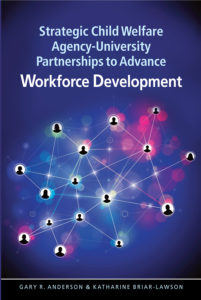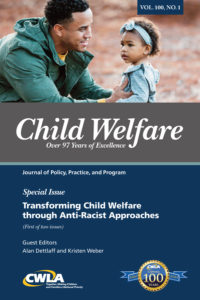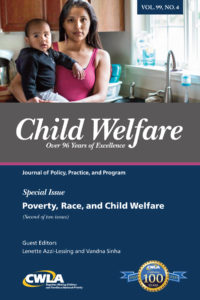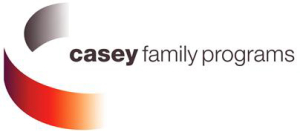
Overview
CWLA’s virtual conference, Moving Research to Practice, examined the practice implications of research collected in recent issues of the Child Welfare journal and other upcoming CWLA publications. These volumes focus on poverty, equity, neglect, sexual abuse, prenatal alcohol and other drug exposure, serving the Latino population, workforce issues, and social determinants of health. CWLA was joined by the editors and authors of those publications, who shared their findings and suggested strategies for incorporating this research into service delivery.
In the opening panel, the editors discussed how this research can be used as a driver for significant change. Four additional panels, spread across three days, featured the trailblazing authors who contributed to the publications. These panels focused on:
- New approaches to building relationships between child welfare/other systems, communities, and families
- Practice improvement and innovation
- Empowering and supporting the workforce
- Implementing change through policy and funding
Each day concluded with breakout sessions, affording attendees an opportunity for discussion and shared learning with peers. In the closing session, the editors returned to provide a summary and a call to action for the field.
CWLA is excited to share this groundbreaking research with the field. In an effort to disseminate this information to as many as possible, and with the support of our generous sponsors, we offered an “All Agency” ticket for large groups.
Contact CWLA2022@cwla.org with any questions.
Special thanks to Casey Family Programs, The Dave Thomas Foundation for Adoption, and The William T. Grant Foundation for their generous support!
Conference Schedule
Tuesday, November 1, 2022
12:00 pm – 2:00 pm Eastern Time
Opening Session
2:30 pm – 4:00 pm Eastern Time
Panel Presentation
4:15 pm – 5:00 pm Eastern Time
Dialogue Sessions
Wednesday, November 2, 2022
12:00 pm – 12:30 pm Eastern Time
Opening / Recap
12:30 pm – 2:00 pm Eastern Time
Panel Presentation
2:30 pm – 4:00 pm Eastern Time
Panel Presentation
4:15 pm – 5:00 pm Eastern Time
Dialogue Sessions
Thursday, November 3, 2022
12:00 pm – 12:30 pm Eastern Time
Opening / Recap
12:30 pm – 2:00 pm Eastern Time
Panel Presentation
2:30 pm – 3:15 pm Eastern Time
Dialogue Sessions
3:15 pm – 4:30 pm Eastern Time
Closing Session
Panels
Relationships with Families & Other Systems:
How Will Our Relationships Have to Change?
Panel members presented findings related to shifting relationships between systems to support families and children so that they do not need to be involved with the child welfare system, and how learning from the experiences of mothers in child welfare prevention services can change our relationships with these systems and the mothers and families.
Panelists include:
- Linda M. Callejas, Ph.D., Research Assistant Professor, College of Behavioral and Community Sciences, University of South Florida
- Shadi Houshyar, Ph.D., Senior Associate, Center for the Study of Social Policy, D.C.
- Kristen S. Slack, Ph.D., Professor, Sandra Rosenbaum School of Social Work, University of Wisconsin-Madison
- Miriam J. Landsman, Ph.D., Associate Professor, University of Iowa School of Social Work, IA
- Kathy Thompson, Iowa Judicial Branch, Children’s Justice, IA
Practice:
Do We Need to be Doing Anything Differently?
This panel covered the latest research related to the impact that issues such as structural poverty, racial inequities, prenatal alcohol and other drug exposure, and the growing diversity of our country have on child welfare practice. The panel also explored how applying the social determinants of health framework might impact practice delivery.
Panelists include:
- Priscilla Day, Professor Emeritus, University of Minnesota Duluth, MN
- Tammy Richards, M.Ed., Senior Research Associate, James Bell Associates, VA
- Whitney Hewlett-Noel, Senior Program Analyst, Center for the Study of Social Policy, DC
- Edward Cohen, Ph.D., Professor, School of Social Work, San José State University, CA
Workforce:
How Does Our Workforce Need to Change?
Panelists addressed findings related to: serving families and communities that are increasingly diverse; new knowledge, training and supports needed for the appropriate care of children with prenatal alcohol and other drug exposures; prioritizing workforce development; and using university-agency partnerships with states and Tribes to support shifting the workforce to create the required changes.
Panelists include:
- Vania S. Buck, Lecturer, School of Social Work, California State University, Chico, CA
- Sharon Newburg-Rinn, Ph.D., Social Science Research Analyst, Office of Data, Analysis, Research & Evaluation, Children’s Bureau, Administration for Children & Families, DC
- Robin Leake, Research Professor and Acting Executive Director at the Butler Institute for Families and Project Director for the National Child Welfare Workforce Institute, CO
- Brenda “Bree” Bussey, Director, Center for Regional and Tribal Child Welfare Studies, MN
Policy and Funding:
What Funding and Policies are Needed to Make the Changes?
Panelists presented findings about the kind of policy and funding changes that are needed to support child welfare reform.
Panelists include:
- Miriam Itzkowitz, MSW, LICSW, Director of Trauma-Informed Care, Institute to Transform Child Protection, MN
- Leah Lindstrom Rhea, Senior Program Manager, Corporation for Supportive Housing (CSH), MN
- Anne Blumenthal, Ph.D. Student, Social Work/Sociology, University of Michigan, MI
Sponsorship
Sponsorship
Sponsorships are essential to our pursuit of disseminating this significant research.
If you feel as passionately as we do about offering this learning opportunity to a broad audience, please consider contributing to our efforts with a sponsorship.
Friend – $1,000+
Help underwrite the conference and provide lower ticket costs.
CWLA will include your logo and a link to your website on our conference webpage, and provide you with an attendee email list after the conference – allowing you to directly connect with our network of child-serving professionals.
Supporter – $5,000+
Your generous support of the conference will be recognized on CWLA’s website, social media accounts, and in all conference-related email blasts to attendees.
After the conference, you will receive an attendee email list.
Advocate – $10,000+
As a Conference Advocate, you will receive recognition on CWLA’s website, social media accounts, and in all conference-related email blasts to attendees, as well as acknowledgement from the “podium” during the opening session.
An attendee email list will be shared after the conference.
Partner – $15,000+
As a Conference Partner, your deep commitment to sharing innovative research will be acknowledged on CWLA’s website, social media accounts, and in all conference-related email blasts to attendees, as well as acknowledgement from the “podium” during the opening and closing sessions.
You will also be thanked on the welcome page for one panel session, and receive an attendee email list after the conference.
As always, we are want to work with you to tailor our sponsorship opportunities to your unique needs. Feel free to reach out if you’d like to design a special sponsorship package, or to discuss sponsoring our 2023 in-person conference RReed@cwla.org
Featured Publications

Strategic Child Welfare Agency-University Partnerships to Advance Workforce Development
Gary R. Anderson and Katharine Briar-Lawson
“Gary R. Anderson and Katharine Briar-Lawson have created a valuable roadmap for child welfare agencies and schools of social work to pursue in order to embark on workforce enhancement strategies and service delivery improvements. Strategic Child Welfare Agency-University Partnerships to Advance Workforce Development is chock full of case examples and lessons learned. The chapters’ authors draw from more than 15 years of experience, across multiple states and Tribes, in creating partnerships, holistic assessments, education and training curricula, and leadership development strategies to enhance the quality and competency of the workforce and to address problems of staff recruitment and retention. The focus on trauma-informed care, racial equity, and interagency collaboration addresses current priorities of child welfare service delivery.” —Joan Levy Zlotnik, PhD, ACSW, Director Emerita, NASW Social Work Policy Institute

The articles in this special double issue focus on the underlying issues that perpetuate and support the overrepresentation of children of color – racism and White supremacy – and anti-racist approaches that improve child and family outcomes and address racial inequities. The authors discuss individual and community consequences of racial disproportionality and disparities, experiences of racism and bias among children and families of color involved in child welfare, strategies for applying anti-racist approaches to child welfare policies and practices, and much more.

This special double issue’s contributors tackle such topics as taking a justice-oriented approach in meeting the needs of children and families; the ways in which poverty creates conditions that are interpreted as parental failings; the colonial roots of neglect in First Nations communities in Quebec; systemic racism and poverty as causes of Black children’s overrepresentation in child welfare; centering the lived experiences of people of color who interact with the child welfare system; listening to and supporting mothers; engaging neighborhoods in child welfare; how poverty can hinder family reunification; working toward income stabilization for families who are vulnerable; how the COVID-19 pandemic may have affected the incidence of child maltreatment in the United States; and much more. Lentte Azzi-Lessing (Boston University) and Vandna Sinha (University of Colorado Boulder) served as guest editors for this special issue.
Upcoming Publications
Child Welfare Journal Special Issue: Prenatal Alcohol and other Substance Exposure
Produced in Partnership with James Bell Associates, with support from Children’s Bureau (ACF, HHS) and CDC
Guest Editors: Julie Collins and Erin Ingoldsby
The Child Welfare League of America (CWLA), in partnership with James Bell Associates and with the support of the Children’s Bureau of the Administration for Children and Families and the Centers for Disease Control and Prevention, are pleased to announce a call for abstracts for a special issue of Child Welfare journal. This issue will examine the role and opportunities for child welfare agencies to respond to and care for children and their caregivers impacted by prenatal alcohol and other drug exposures. Policies and practices relevant to state, local/county, and Tribal child welfare agencies, their collaborating partner organizations, and the children and families they serve will be discussed. Research has demonstrated that prenatal substance exposure, especially to alcohol, can negatively impact child welfare outcomes. Children affected by prenatal substance use may be more likely to be removed from home and experience placement instability while in temporary care. Their well-being may suffer if appropriate service referrals are not made when prenatal exposure and associated conditions are unrecognized. This can be a particular issue for exposure-related impairments that emerge after infancy, such as fetal alcohol spectrum disorders (FASDs). Birth parents, relative care providers, and foster parents may need training and support to address difficult child behaviors and other needs—but there are barriers that can reduce access to services. Punitive state policies, such as defining prenatal exposure as a criminal act, may deter families from disclosing information and receiving appropriate referrals. In many locations, families of color (including those who are Black, Latino, and American Indian/Alaskan Native) may also experience higher rates of removals but may not have equal access to supportive services. Child welfare agencies have the opportunity to preserve families and improve child safety and well-being by providing training to staff and using supportive approaches and evidence-informed services in their work with families.
Child Welfare Journal Special Issue: Social Determinants of Health and Child Welfare Services
Produced in Partnership with Centene Corporation
Guest Editors: Julie Collins and Centene team (Cheryl Fisher, Karen Rogers, David Allen, Stan Waddell, and Haleta Belai)
The special issue will focus on the intersection of the social determinants of health (SDoH) and child welfare. We are interested in examining how a focus on SDoH can improve the delivery of services to children and families who are involved in child welfare. We are also interested in how a focus on SDoH in the health care arena can positively impact children, adolescents, and families so that they don’t come in contact with the child welfare system. Submission topics are not limited to children and adolescents, but rather should incorporate the entire family. The body of research and literature related to how social, economic, and environmental factors impact overall health is growing. It generally is accepted that addressing social needs is important in improving an individual’s health and decreasing health disparities. However, understanding how to address SDoH in an impactful way still is a challenge. This is especially so for the child and family serving systems when engaging the child welfare population, which has often experienced/experiences significant adverse childhood experiences and other issues such as intergenerational trauma and abuse, poverty, chronic neglect, economic insecurities, housing instability, and residing in communities where there is significant violence. Furthermore, the role of the child welfare community in addressing these issues is even less understood. The COVID-19 pandemic further has highlighted the significant disparities for communities, families, and children who are Black, Brown, and Indigenous, many of whom experience inequities in child welfare. The goal of this special issue is to advance our understanding by featuring policy, theoretical, and empirical papers focused on the intersection of SDoH and child welfare. We are especially interested in examples from other systems that might be relevant for use within the child welfare system.
Child Welfare Journal Special Issue: The Promotion of Latinx Child Well-being
Guest Editors: Robert Ortega and Maria Quintanilla
Although documentation of the experiences of Latinx children within the child welfare system has been inconsistent, there remains a disproportionate representation of Latinx children and youth affected by the social conditions in which they are born, grow, live, work, and age across the United States and Puerto Rico. The goal of this special issue is to bring attention to the significance of the young, rapidly growing Latinx population in the United States who are accompanied by an increase in risk factors of child maltreatment associated with poverty and social inequality, income insufficiency, and the persistent lack of resource availability, accessibility, acceptability, accountability, adaptability, and affordability. Manuscripts should present new research or program evaluation findings, as well as describe innovative policies and practices for serving Latinx children, including the zero-to-five population, youth, and families who currently are involved in child welfare systems, service, and primary prevention approaches that protect basic human rights. The special issue aims to highlight diverse Latinx ancestries, and the range of social factors relevant to employment and income, education and occupations, gender equity, racial integration, food security, housing, and their cumulative toll on Latinx health, mental health, safety, and stability that impede the promotion of the Latinx child’s and family’s well-being and put Latinx families at risk for child welfare involvement.
Book on Child Neglect [working title]
There is growing recognition that child neglect—which when chronic, can have harmful effects of children’s development and well-being—often reflects families’ lack of resources due to poverty and other inequities. The high correlation of poverty and neglect calls for structural interventions and racially equitable approaches that address family poverty; combat bias, disparities, and disproportionalities; and safely keep families together when possible. CWLA has prioritized the need to address child neglect, seeking new understanding and solutions to this complex issue and new visions of child protection systems as family-strengthening systems. CWLA Press plans to publish a book that captures emerging thinking and strategies focused on the structural determinants of what is commonly identified as child neglect, how best to support families facing economic adversity, and how to promote racial equity in our child- and family-serving systems.


